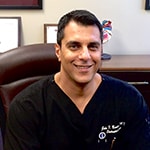What are Arrhythmias?
Arrhythmias are heart rhythm problems that are due to electrical irregularities in the heart’s circuit. Electrical impulses are what signal for the heart to beat in time. When the electrical impulses aren’t firing correctly, this results in a heart rate that is too slow, too fast, or irregular (heart fluttering). There are several different types of arrhythmias, depending on whether they are coming from the atria or ventricles. Heart arrhythmias may never cause other symptoms, but they can sometimes be a sign of an underlying medical condition.
What Causes Arrhythmias?
There are many factors that can contribute to the development of arrhythmias, including:
- Scarring from a previous heart attack
- Changes to the heart’s structure
- Blocked arteries
- High blood pressure
- Smoking
- Drinking too much alcohol or caffeine
- Drug use
- Stress
- Medications
- Diabetes
- Sleep apnea
- Genetics
What Are the Symptoms of Arrhythmias?
Many of those who have an arrhythmia never experience symptoms. Your doctor may detect the irregular heart rate with an ECG, which senses the heart’s electrical activity. Others with arrhythmias may experience the following symptoms as well:
- Heart fluttering
- Chest pain
- Shortness of breath
- A racing heart (tachycardia)
- A slow heart (bradycardia)
- Sweating
- Fainting (syncope)
While occasional symptoms may be nothing to worry about, if you experience sudden or frequent symptoms, contact your doctor for an examination. Heart arrhythmias can be associated with stroke, heart attack, and heart failure, so it’s important to determine the exact cause of your symptoms in order to receive proper treatment.
Have Inquiries About Our Services?
How is Arrhythmia Treated?
To diagnose a heart arrhythmia, Dr. Beshai will perform several heart tests to determine which type of arrhythmia you are experiencing. This might include an ECG to detect the heart’s electrical impulses, including the rate and strength. An ECG takes a few minutes to complete, and it might not always detect an irregular heartbeat during that time frame. Therefore Dr. Beshai may also request a Holter monitor to record the heart’s activity over a longer period of time, typically 24-48 hours. This will allow a longer record of the heart’s activity and any abnormalities throughout the day. A stress test can also be conducted, measuring how the heart responds to exercise.
Once an arrhythmia is detected, Dr. Beshai will recommend the appropriate treatment. Medication is usually prescribed first to attempt to regulate the heart rate. If this is unsuccessful, Dr. Beshai might suggest an implantable device like the pacemaker or implantable cardioverter-defibrillator (ICD). A pacemaker and ICD connect to the heart to detect electrical signals. When the signals are irregular, the device sends an electrical wave to the heart, helping it beat normally. Depending on the type of arrhythmia and its cause, Dr. Beshai can also perform ablation to destroy the tissue causing an irregular heartbeat.
Scheduling Your Arrhythmia Treatment Appointment
Dr. Beshai has seen many cases of arrhythmias and is highly experienced with the diagnostic tests and treatments needed to manage them. If you experience bothersome symptoms of arrhythmia and want to know more about your treatment options, please call our office at 480-634-4449 or fill out our online form and schedule your appointment at the Heart Rhythm Institute of Arizona.
The Heart Institute of Arizona has a wide array of services that come with our premium care. From in-office dianostics and treatable conditions, to hospital based procedures, we’ve got your heart covered.
Dr. Beshai is a board-certified electrophysiologist internationally renowned and respected for his expertise and research. Having published in major medical journals and travelled all over the world to present research, he is dedicated to providing innovative, state-of-the-art care to his patients.
- John F. Beshai, MDhttps://heartbeataz.com/author/heartbeata/
- John F. Beshai, MDhttps://heartbeataz.com/author/heartbeata/
- John F. Beshai, MDhttps://heartbeataz.com/author/heartbeata/
- John F. Beshai, MDhttps://heartbeataz.com/author/heartbeata/

